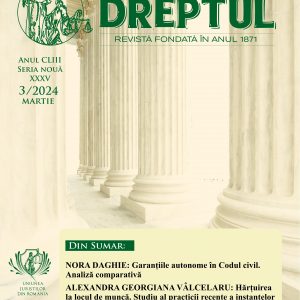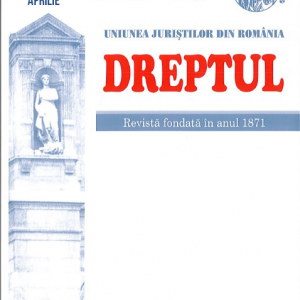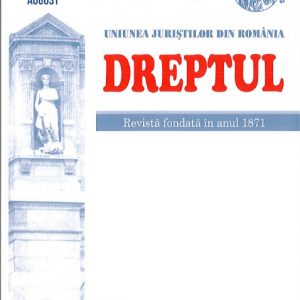-

-
 According to art. 147. (4) of the Constitution, the Constitutional Court rulings are generally binding. Therefore, the public authorities, including courts, regardless of their level, must observe the Constitutional Court rulings both in terms of the operative part and recitals thereof. Although they do not constitute a source of law, the High Court of Cassation and Justice judgments rendered after settlement of an appeal in the interest of law, require the courts a particular solution to a law issue, therefore an interpretation of legal rules. When performing the interpretation and application of law, a contingent conventionality control also occurs; such control is carrying out by this Court whilst assuming that the courts’ divergent practice is given by the different application of the (European) Convention on human rights and fundamental freedoms provisions. Not infrequently, the High Court of Cassation and Justice’s jurisprudence on the matters submitted to trial did not coincide with that of the Constitutional Court, and this study aims to point out and analyze such cases. The proposed solution takes into account a possible constitutionality review of the previously reported judgments of the High Court of Cassation and Justice; such control has already been carried out indirectly in certain rulings of the Constitutional Court.
According to art. 147. (4) of the Constitution, the Constitutional Court rulings are generally binding. Therefore, the public authorities, including courts, regardless of their level, must observe the Constitutional Court rulings both in terms of the operative part and recitals thereof. Although they do not constitute a source of law, the High Court of Cassation and Justice judgments rendered after settlement of an appeal in the interest of law, require the courts a particular solution to a law issue, therefore an interpretation of legal rules. When performing the interpretation and application of law, a contingent conventionality control also occurs; such control is carrying out by this Court whilst assuming that the courts’ divergent practice is given by the different application of the (European) Convention on human rights and fundamental freedoms provisions. Not infrequently, the High Court of Cassation and Justice’s jurisprudence on the matters submitted to trial did not coincide with that of the Constitutional Court, and this study aims to point out and analyze such cases. The proposed solution takes into account a possible constitutionality review of the previously reported judgments of the High Court of Cassation and Justice; such control has already been carried out indirectly in certain rulings of the Constitutional Court. -
 The aggravation of the global ecological problems, including by multiplying and amplifying the effects of the acts of massive and sustainable destruction of the environment, as well as intensifying the concerns for its protection require also the increase of the contribution of the law, especially by strengthening the criminal response, by stressing the particularisation and increasing the efficiency of the measures adopted for this purpose. In expressing this tendency we are witnessing the emergence of a process of recognition and inclusion, thus, among international crimes, of the crime of ecocide, together with and in the potentiation of the meanings of the already existing one of genocide. It is perceived from a legal point of view and it is established in terms of action a new absolute value, that of the security of the planet. In this way, the concept of „crime against ecoumanity” is forged, opening new horizons for legal reflection and for relevant legal-administrative and judicial practice. As part of the effective approach, the definition of „ecocide” has a preliminary nature and it has already known relevant expressions. Among the latest projects of an international definition of ecocide it is distinguished that of the L. Neyret team (2015) and of the Stop Ecocid Foundation (2021). Their analysis, accelerated in the context of the absolute affirmation of the climate change, generates new concrete and doctrinal challenges, the expression of which is assumed as such.
The aggravation of the global ecological problems, including by multiplying and amplifying the effects of the acts of massive and sustainable destruction of the environment, as well as intensifying the concerns for its protection require also the increase of the contribution of the law, especially by strengthening the criminal response, by stressing the particularisation and increasing the efficiency of the measures adopted for this purpose. In expressing this tendency we are witnessing the emergence of a process of recognition and inclusion, thus, among international crimes, of the crime of ecocide, together with and in the potentiation of the meanings of the already existing one of genocide. It is perceived from a legal point of view and it is established in terms of action a new absolute value, that of the security of the planet. In this way, the concept of „crime against ecoumanity” is forged, opening new horizons for legal reflection and for relevant legal-administrative and judicial practice. As part of the effective approach, the definition of „ecocide” has a preliminary nature and it has already known relevant expressions. Among the latest projects of an international definition of ecocide it is distinguished that of the L. Neyret team (2015) and of the Stop Ecocid Foundation (2021). Their analysis, accelerated in the context of the absolute affirmation of the climate change, generates new concrete and doctrinal challenges, the expression of which is assumed as such. -
 As the phrase „contractual balance” is too vague, for the purpose of clarifying its content, it has been used the notion of proportionality which is translated by a ratio between finality (purpose) and the means for achieving it. The proportionality, in its turn, does not consist in a mathematical relation, for this would mean ignoring the essence of the contract, namely the will of the contracting parties. So further specifications have been necessary in the sense that the proportionality is, at the same time, a measurement instrument and a sanction, namely a principle of fair-measure that puts into practice a finalised proportionality which relates to the legitimate objectives pursued or that should be pursued, which requires sometimes a strict proportionality, other times a relative proportionality, consisting in sanctioning only the obvious abuses. The proportionality contributes to the implementation of the principle of maintaining the durability and the efficiency of the contract, which favours the maintaining of the quality of the contract content, both at the time of its formation and for the duration of its performance, the sanction falling within the institution of lesion and, respectively, of unpredictability.
As the phrase „contractual balance” is too vague, for the purpose of clarifying its content, it has been used the notion of proportionality which is translated by a ratio between finality (purpose) and the means for achieving it. The proportionality, in its turn, does not consist in a mathematical relation, for this would mean ignoring the essence of the contract, namely the will of the contracting parties. So further specifications have been necessary in the sense that the proportionality is, at the same time, a measurement instrument and a sanction, namely a principle of fair-measure that puts into practice a finalised proportionality which relates to the legitimate objectives pursued or that should be pursued, which requires sometimes a strict proportionality, other times a relative proportionality, consisting in sanctioning only the obvious abuses. The proportionality contributes to the implementation of the principle of maintaining the durability and the efficiency of the contract, which favours the maintaining of the quality of the contract content, both at the time of its formation and for the duration of its performance, the sanction falling within the institution of lesion and, respectively, of unpredictability. -
 After a general presentation of the institution of house arrest, the author analyzes a specific aspect referring to this new preventive measure provided in the new Criminal Procedure Code, namely the maximum duration of house arrest pending judgment at first instance.
After a general presentation of the institution of house arrest, the author analyzes a specific aspect referring to this new preventive measure provided in the new Criminal Procedure Code, namely the maximum duration of house arrest pending judgment at first instance. -

-
 La France a instauré dès 19641 un système d’organisation et de gestion de l’eau par bassin. La planification résulte de la loi de 19922 avec la création du Schéma directeur d’aménagement et de gestion des eaux (SDAGE) à l’échelle du bassin et du Schéma d’aménagement et de gestion des eaux (SAGE) par sous-bassin3. En application des diverses directives communautaires ou de politiques spécifiques (risques, assainissement), ces planifications de base sont complétées par des instruments de gestion, des mesures et des programmes, à l’échelle du district hydrographique, du sous-district hydrographique. Cette planification a été enrichie d’autres outils de planification, le plus souvent à une échelle plus localisée (zone d’inondations par exemple).
La France a instauré dès 19641 un système d’organisation et de gestion de l’eau par bassin. La planification résulte de la loi de 19922 avec la création du Schéma directeur d’aménagement et de gestion des eaux (SDAGE) à l’échelle du bassin et du Schéma d’aménagement et de gestion des eaux (SAGE) par sous-bassin3. En application des diverses directives communautaires ou de politiques spécifiques (risques, assainissement), ces planifications de base sont complétées par des instruments de gestion, des mesures et des programmes, à l’échelle du district hydrographique, du sous-district hydrographique. Cette planification a été enrichie d’autres outils de planification, le plus souvent à une échelle plus localisée (zone d’inondations par exemple). -
 In the study below, the author examines the regulation of the inheritance right of the surviving spouse in the new Romanian Civil Code, (published in July 2009, but not yet in force), in comparison with the current regulation in this field (the Decree-Law no. 319/1944). In this respect, we note that the new Romanian Civil Code keeps the essence of the previous regulation, to which it adds a series of new elements and aspects realized by the legal doctrine over time. Therefore, the author concludes that the new Romanian Civil Code, “provides a semi-complete, fair, flexible and current regulation in the field of inheritance rights of the surviving spouse”.
In the study below, the author examines the regulation of the inheritance right of the surviving spouse in the new Romanian Civil Code, (published in July 2009, but not yet in force), in comparison with the current regulation in this field (the Decree-Law no. 319/1944). In this respect, we note that the new Romanian Civil Code keeps the essence of the previous regulation, to which it adds a series of new elements and aspects realized by the legal doctrine over time. Therefore, the author concludes that the new Romanian Civil Code, “provides a semi-complete, fair, flexible and current regulation in the field of inheritance rights of the surviving spouse”. -
 In the above study, the authors make a comparison between the provisions of the new Romanian Civil Code (published on 24 July 2009, but not yet in force) and the provisions of the current code (of 1865), regarding the rights of succession of the relatives of the deceased. After a thorough analysis, they reach the conclusion that the new Code provides a quasi-complete adequate regulation in this matter, taking over the judicious principles established by the current Civil Code, updating the specialized legal language, eliminating what is redundant, de lege lato, and bringing the necessary additions.
In the above study, the authors make a comparison between the provisions of the new Romanian Civil Code (published on 24 July 2009, but not yet in force) and the provisions of the current code (of 1865), regarding the rights of succession of the relatives of the deceased. After a thorough analysis, they reach the conclusion that the new Code provides a quasi-complete adequate regulation in this matter, taking over the judicious principles established by the current Civil Code, updating the specialized legal language, eliminating what is redundant, de lege lato, and bringing the necessary additions. -
 Personality’s rights are non-patrimonial rights, inherent to the natural person, in the sense that they are directly attached to and inseparable from the real man, and they serve to the free development of his personality. The new Civil Code regulates the following rights of the personality: right to life, right to health, right to physical and mental integrity, right to dignity, right to respect for private life, right to his own image, identification attributes of the natural person, and the right to dispose of oneself. They can be grouped in two categories: rights that protect the human body and its biological functions, and rights that protect moral values. The first category of rights is governed by three principles: the principle of inviolability of the human body (which may suffer certain exceptions); the principle of non-patrimoniality of the human body, and the principle of the priority of interest and of the good of the human being. The rights which protect moral values have a content determined by their relation to a series of generic notions, incompatible with a precise definition, such as freedom, honor, private life, respect, for which reason the Romanian lawmaker strove to contour such notions; as well as by the regulation of some of the deeds which may impair such rights. Some of the personality’s rights may suffer limitations, which are imposed either by the necessity to protect some major public values, or by the exercise of other persons’ similar rights.
Personality’s rights are non-patrimonial rights, inherent to the natural person, in the sense that they are directly attached to and inseparable from the real man, and they serve to the free development of his personality. The new Civil Code regulates the following rights of the personality: right to life, right to health, right to physical and mental integrity, right to dignity, right to respect for private life, right to his own image, identification attributes of the natural person, and the right to dispose of oneself. They can be grouped in two categories: rights that protect the human body and its biological functions, and rights that protect moral values. The first category of rights is governed by three principles: the principle of inviolability of the human body (which may suffer certain exceptions); the principle of non-patrimoniality of the human body, and the principle of the priority of interest and of the good of the human being. The rights which protect moral values have a content determined by their relation to a series of generic notions, incompatible with a precise definition, such as freedom, honor, private life, respect, for which reason the Romanian lawmaker strove to contour such notions; as well as by the regulation of some of the deeds which may impair such rights. Some of the personality’s rights may suffer limitations, which are imposed either by the necessity to protect some major public values, or by the exercise of other persons’ similar rights. -
 In this study the author, after making certain considerations on the concepts of human rights and world order, in the context of globalization, as well as of the trends of globalization of law, points out to the necessity to undertake some urgent actions in order to proclaim, establish and, mostly, guarantee the human rights and fundamental freedoms worldwide. In the author’s opinion these legal rules which have the consent of all States would represent, along with solving the contradictions between the international economic system with a quasi-global organization and the prevailing political structure of the human society which is at state level, a starting point in achieving a real world order, in compliance with the current stage of the socio-historical movement and with the challenges of the 21st century.
In this study the author, after making certain considerations on the concepts of human rights and world order, in the context of globalization, as well as of the trends of globalization of law, points out to the necessity to undertake some urgent actions in order to proclaim, establish and, mostly, guarantee the human rights and fundamental freedoms worldwide. In the author’s opinion these legal rules which have the consent of all States would represent, along with solving the contradictions between the international economic system with a quasi-global organization and the prevailing political structure of the human society which is at state level, a starting point in achieving a real world order, in compliance with the current stage of the socio-historical movement and with the challenges of the 21st century. -
 In this study, the author examines whether after 1 October 2011 (when the new Romanian Civil Code entered into force), to what extent the creditor may enforce the shares (portions of the share capital of the limited – liability – company) belonging to its debtor, corroborating art. 66 of the Law no. 31/1990 on companies by Art. 1887 of the new Civil Code. One reaches the conclusion that the enforcement of the creditor on the shares in question is more illusory than real. That is, a number of de lege ferenda proposals are made, meaning that the right of enforcement on the debtor’s shares should change from a utopia into a reality.
In this study, the author examines whether after 1 October 2011 (when the new Romanian Civil Code entered into force), to what extent the creditor may enforce the shares (portions of the share capital of the limited – liability – company) belonging to its debtor, corroborating art. 66 of the Law no. 31/1990 on companies by Art. 1887 of the new Civil Code. One reaches the conclusion that the enforcement of the creditor on the shares in question is more illusory than real. That is, a number of de lege ferenda proposals are made, meaning that the right of enforcement on the debtor’s shares should change from a utopia into a reality.
